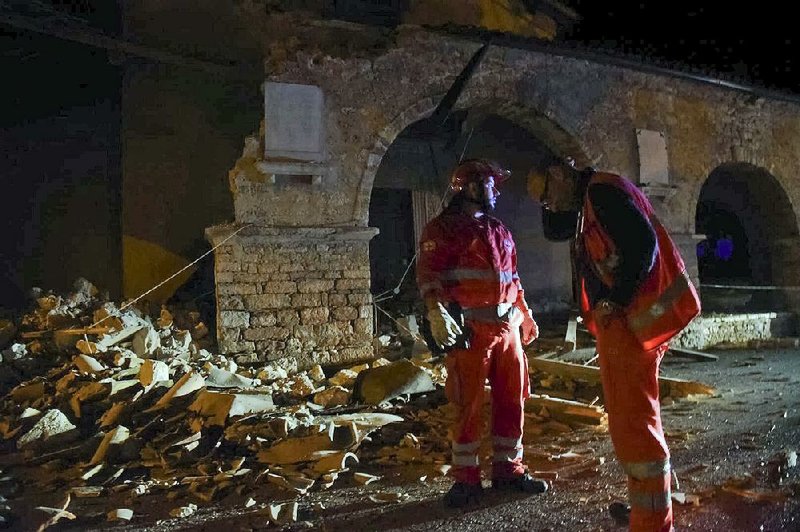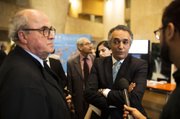Two quakes shake up central Italy
ROME — A pair of earthquakes shook central Italy on Wednesday, crumbling buildings, knocking out power and sending panicked residents into the rain-drenched streets just two months after a powerful earthquake killed nearly 300 people.
Hours after the temblors hit, there were no reports of serious injuries or signs of people trapped in rubble, said the head of Italy’s civil protection agency, Fabrizio Curcio. A few people were treated for slight injuries or anxiety at hospitals in the most affected regions of Umbria and Le Marche, he said. A 73-year-old man died of a heart attack, possibly brought on by the quakes, area authorities told the ANSA news agency.
The temblors were actually aftershocks to the Aug. 24 quake that struck a broad area of central Italy, demolishing buildings in three towns and their hamlets, seismologists said.
The first quake carried a magnitude of 5.4, but the second one was stronger at 6.1, according to the U.S. Geological Survey. Italy’s national volcanology center said the first quake struck at 7:10 p.m. with an epicenter in the Macerata area, near Perugia in the quake-prone Apennine Mountain chain. The second temblor struck two hours later at 9:18 p.m. with a similar depth.
Gambia to join exit from world court
DAKAR, Senegal — Gambia has become the third African nation to say it will leave the International Criminal Court, deepening fears of a mass pullout from the body that pursues some of the world’s worst atrocities.
In announcing the decision Tuesday night on national television, Gambia accused the court of unfairly targeting Africa and calling it the “International Caucasian Court for the persecution and humiliation of people of color, especially Africans.”
The move comes after South Africa, once a strong supporter of the court under former President Nelson Mandela, notified the United Nations secretary-general last week that it would leave the court. Burundi’s president last week signed legislation to leave the court as well.
Fatou Bensouda, a Gambian prosecutor for the world court, declined to comment specifically on Gambia’s withdrawal but said the court would continue doing its job of bringing to justice those responsible for atrocities.
Only Africans have been charged in the six cases that are ongoing or about to begin, though preliminary International Criminal Court investigations have been opened elsewhere in the world.
ISIS-tied militants seize Somali port
MOGADISHU, Somalia — Residents say fighters linked to the Islamic State extremist group have seized an ancient port town in Somalia’s semiautonomous northeastern state of Puntland.
Hassan Adan, an elder in Qandala, said up to 50 armed militants captured the town Wednesday after security forces withdrew. The town is 47 miles east of Puntland’s commercial hub, Bossaso.
Adan said the attackers raised their black banner in the town.
The development marks the first victory for the fighters, who are expanding the areas under their control as it competes with the al-Shabab extremist group.
The fighters broke away from al-Shabab and declared allegiance to the Islamic State last year.
Al-Shabab sees the splinter group as a threat to its operations in the Horn of Africa nation.
UNESCO riles Israelis on Jerusalem
PARIS — UNESCO’s World Heritage Committee on Wednesday approved a new resolution on the status of conservation of the Old City of Jerusalem that drew angry accusations from Israel that the document denies Judaism’s deep ties to the site. The United States decried the resolution as “inflammatory.”
In Wednesday’s secret ballot, the U.N. cultural body agreed to retain the walled area, home to key Jewish, Christian and Muslim holy sites, on the list of endangered world heritage. It also criticized Israel for its continuous refusal to let the body’s experts access Jerusalem’s holy sites to determine their conservation status.
The document refers to the Jerusalem site that Jews call the Temple Mount only by its Arab name, the Noble Sanctuary — a significant semantic decision also adopted by UNESCO’s executive board last week, when it was condemned by Israel and its allies. The site is revered by Jews and Muslims.
Israeli Prime Minister Benjamin Netanyahu criticized the “absurdity” of Wednesday’s decision and said he would recall his ambassador to UNESCO for consultations on how to proceed.

